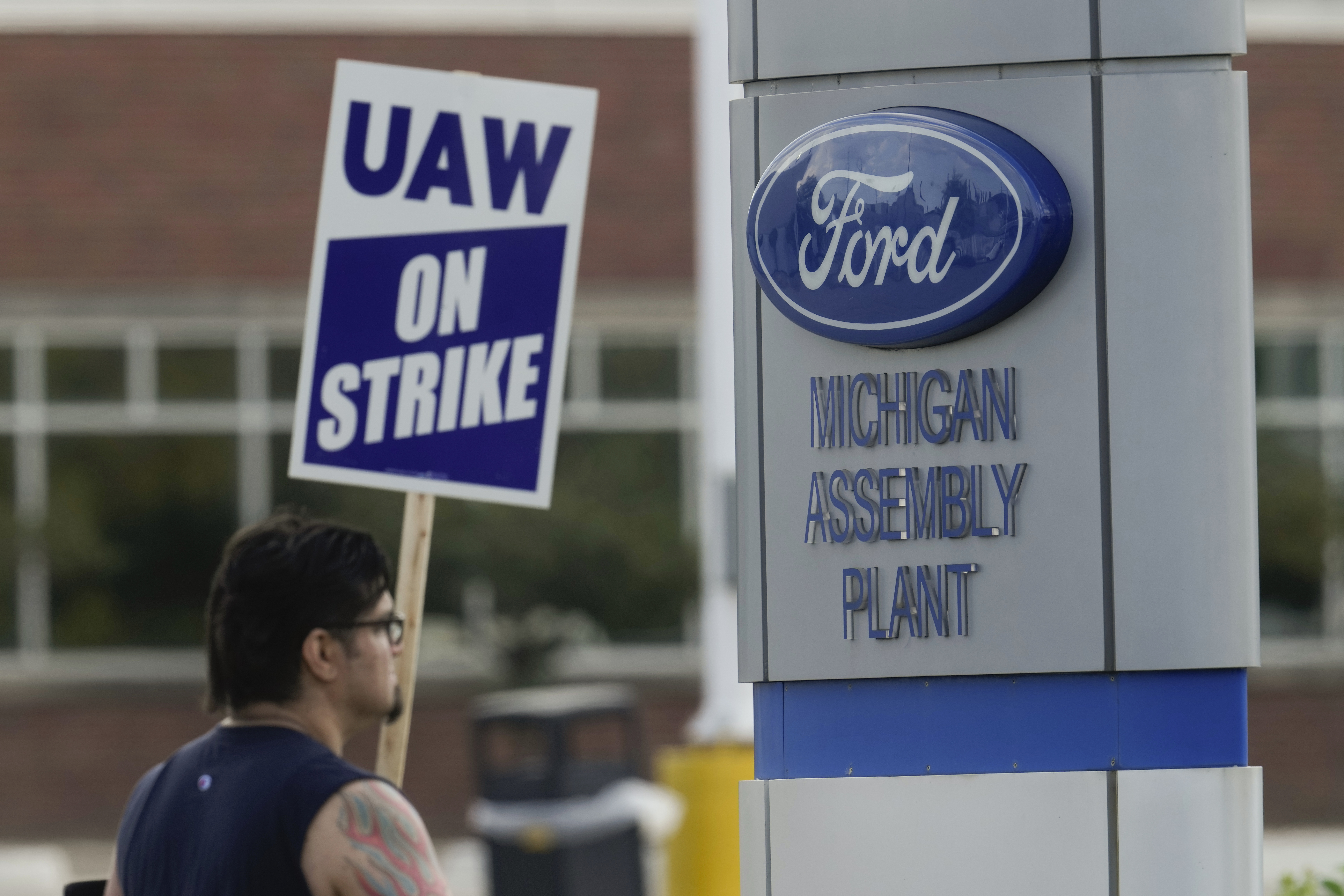Alternative heading; Greedy CEOs on their 5 holiday mansion refusal to pay living wages could disrupt EV rollout.
I don’t think many environmentalists are like, “My dream is a car-dominated society but electric.” It’s an improvement, to be sure, but I feel like every (realistic) environmentalist would prefer trains and trolleys to planes and cars.
This seems like one of those situations where every leftist is like, “I think about unions, transportation, and housing.” and the media somehow decides the left is hellbent on forcing people to attend sensitivity training in Smart Cars.
This reminded me of a person online talking about how they didn’t understand why tree-huggers appreciated wind power despite the bird strike numbers - well because climate change itself is a much bigger fish!
Or also because of the bird strike numbers. I believe they are quite low.
Many such complaints were based on an old wind farm in Altamont Pass that did have a serious problem. However it was a mountain pass on a migratory bird route and the towers were open framework with plenty of spots for roosting. Once we stopped those two things, bird losses dropped precipitously.
I believe people making those complaints have also lost perspective. My support for anything to further reduce the remaining bird losses is not inconsistent with the belief that we already well into a better spot.
People making those complaints also seem unable to expand their minds to the huge bird loss from the polluted air pr if we didn’t
Most people making those complaints at this point are bad-faith conservatives.
EV cars are just a way to keep the “happy motoring” society going with a veneer of environmentalism.
Not a veneer. EVs powered by renewable energy contribute almost nothing to GHG emissions.
OK we don’t make nearly enough renewable energy to meet the demand of American motorists, and likely never will. We use millions of barrels of oil each day. How many wind turbines will match that?
Are they “greener” than gasoline vehicles? Sure, but it’s still tremendously wasteful of energy. Most of the energy is expended moving the weight of the vehicle and batteries. Not only this but cars dictate how we build and design urban areas. we will continue building and expanding cities and towns to accommodate cars and their sense of distance. We’ll also need to continue wasting space for parked vehicles. This is all tremendously wasteful. We will also continue relying on a massive network of paved roads that require constant maintenence and are themselves made out of oil.
There’s also the issue of tires. They shed rubber and it goes into our environment, affecting humans and wildlife. It’s not a small thing.
In short, nothing about cars can be truly green. We’d be much better off investing in networks of highspeed rail, light rail, cycle lanes, and electric busses. These would have much bigger impacts, and much sooner. But instead we are committed to happy motoring and the drive-thru lifestyle
OK we don’t make nearly enough renewable energy to meet the demand of American motorists, and likely never will.
You’ve been reading too much propaganda.
https://www.bloomberg.com/graphics/2021-opinion-renewables-will-power-future-of-us-energy/
Most of the energy is expended moving the weight of the vehicle and batteries.
Yes this is literally how a vehicle works
Cool, well, enjoy your fantastic future. Happy motoring!
Thanks!
deleted by creator
It’s funny, I can’t tell if you’re a left wing “the media are all liars” nutjob or a right wing “the media are all liars” nutjob.
Horseshoe theory in action, I guess
deleted by creator
Their parts get made. They get manufactured. Pretty sure that involves fairly substantial emissions, just not compared to what we have now.
Sure, everything involves emissions, but when we’re talking about a 80%-90% reduction over what we have now, you can’t just handwave that away. That’s a tiny fraction of our current position.
And if we’re going to consider that, let’s consider the ghg emissions of laying new bike trails and railroads? Of building new buses and trains?
Manufacturing emits GHGs for anything but it’s a small fraction of the life cycle GHGs of a vehicle, especially if the electricity used in manufacturing is also renewable.
deleted by creator
the people designing, making, and distributing all use GHG. The robots that make them all run on GHG. The distribution networks that support them all use GHG. Even the power that goes into the charge stations are coal and oil powered.
That’s a myth, and fossil fuel propaganda.
Much of the entire supply chain, and most of the energy mix that powers them, are already renewable and that fraction is increasing all the time.
For example, in California the power mix is roughly 50% renewable. In San Francisco it’s almost 100%. So if I purchase a Tesla, there’s very little fossil fuels in the post manufacturing cycle.
The whole point of EVs is to decouple transportation with fossil fuels. As our grid gets greener, so do our vehicles.
deleted by creator
You can regulated-capitalism your way out though.
Just because nothing comes out of a tailpipe doesn’t magically erase the environmental impact they have.
It does erase something like 80-90% of the environmental impact they have. Not magically, just because EVs are designed to be better for the environment.
Why should we compromise on labor rights in favor of environmentalism? The latter wouldn’t be such a problem if the former had been taken care of decades ago.
EVs don’t save the environment, they save the car industry.
EV != car. And even those have a use case. Having good EVs is necessary to wean off fossil fuels.
No one thing ‘saves’ the environment, it’s beyond fucked at this point but EVs sure as shit is part of the solution and you can piss off with your perfection being the enemy of good stance here.
Car industry isn’t going anywhere, regardless. Plus, do you really think vehicles with less maintenance and longer lifespans is going to save the industry?
If the alternative would be cutting production by 95%? Yes.
What gives you that idea?
I honestly don’t get some people where they constantly want to pit everyone and everything against each other. Honestly it’s not some stupid zero sum game here.
If everyone got along, the republican party wouldn’t exist. Their power is division of the people.
While I generally support such things, how about because the dominant EV manufacturer is not unionized and these companies are already struggling for relevance? There has to be a balance between treating employees fairly and maintaining a successful business. Hopefully the results will be somewhere in that balance zone
Show me the (unbiased) research that says American auto makers’ problems are having a unionized workforce.
Clearly not, but if they’re already struggling to remain relevant in this transition, paying significantly more to employees won’t help. I mean, they offered 20% raises, UAW counters 40%: let’s all meet at 30% with retraining, job transfer guarantees, insourcing, and get back to work. Given all the press about fewer parts, fewer workers, legacy automakers’ habit of mass layoffs to start over with newer cheaper labor, previous policies of outsourcing to non-union contractors, there’s a lot more to good quality jobs than just the pay
There is no balance. If you can’t treat employees fairly you don’t have a successful business. You have a slave shop
Environmentalists support it because they support workers rights. Also, if you really care for the environment you know that EVs are not the solution and will never be the solution for the environment, just the car companies.
EVs are not THE solution, there is no one solution. EVs are a PART of the solution.
They have their part in the solution, but the more we rely on ev the less we do more important stuff like public transportation, walkable cities, proper zoning, less unnecessary office time, etc. If we remove every petrol car ever and just make them all ev we will still have an enormous problem, but while we doing that we necessarily neglect everything else. Making the society not car-centric is more important, that’s where all the focus should be. Remaining cars should obviously be electric.
I don’t know why you’re being downvoted, you’re right. Something as massive as climate change requires extreme change from us. A band-aid fix like EVs is only going to give the illusion of a solution. Reducing suburban sprawl and expanding mass transit will do much more for the environment than EVs ever could.
Yes, EVs are a good step, but they’re little more than a compromise, we should be pushing to reduce our reliance on cars and semis as much as possible. The focus on EVs makes some people lose sight of this. People seem to be reluctant to change, holding out for some drop-and-swap fix that will solve everything. At the end of the day though, even the greenest car is way less energy efficient than the average bus, while also consuming much more road space per person.
We can do more than one thing, changing cars to ev does not distract from building more windmills.
This isn’t about more windmills though, this is about EVs perpetuating the atomization and car dependency that got us into this mess, and thus being at best a band-aid fix and at worst preventing better solutions from taking form.
How would EVs prevent better solutions? You keep saying this but I don’t understand why.
EVs are a distraction and driver funding from public transport options to spaces for cars. Cars need infrastructure such as traffic stops, crossings, parking, etc. And with metropolitan areas becoming increasingly crowded, all of this infrastructure takes up space and costs the city a lot of money as the land value rises.
For example, a car parking space where I’m from will cost something like $70/day. A shop double the size would be leased at $30k/month. Our rate money goes into subsidising the car parking spots because they need to sit somewhere where they’re not being used.
EVs (in car form) still use the same spaces as cars and use up money that could be better spent on other things to improve city accessibility. That’s a bit of the money part.
From an efficiency perspective, any kind of car (EV or otherwise), is extremely inefficient in Metropolitan areas because a large portion of the time is spent waiting in traffic. Any other type of transport moves more people per second than cars such as motorbikes, scooters, bicycles, trains, trams, buses etc. So, you’re allowing a significant chunk of infrastructure to be occupied by an extremely ineffective mode of transport in a city of millions. If you remove the entire aspect of private vehicles in Metro areas, you free l suddenly free up a lot of space and increase efficiency for the other modes of transport.
EVs or cars would be useful in low density areas where the efficiency would be higher than using any other type of transport and would have a much more minimal impact on the climate than if large cities all used EVs.
We have the technology and the smarts to build a better world but we need to rip the band-aid off and understand that the problems that arise in our day to day is of our own making and that we can absolutely rebuild it from the ground up so that it is more sustainable.
If you remove the entire aspect of private vehicles in Metro areas, you free l suddenly free up a lot of space and increase efficiency for the other modes of transport.
But we don’t HAVE those other means of transport, not nearly at the level to replace cars and not even at all in some places.
Your equation is basically “remove cars, replace with transit” but you’re totally hand waving away the second part.
All the government subsidies to benefit EVs are a drop in the bucket compared to the cost of retooling infrastructure to support public transit. It needs to be done, but it can’t be done quickly without a massive, exponential increase in funding, and EVs won’t cover that gap.
Being anti-EV is being against one of the most useful, efficient, and effective ways of lowering ghg emissions we have.
Your idea of “ripping the bandaid off” leaves millions of people stranded while they wait for transit to be built.
We can do both and must do both. EVs for now, transit for future.
Funding is finite. Every bit of new EV-improvement research represents funding that could have been used elsewhere, like windmill-improvement research.
Most research is done by private companies. There are grants and tax incentives but they’re a small amount of the overall green economy.
It absolutely distracts from building good not car-centric infrastructure, almost by definition. The mindset that the only problem with car-centric world is that they emit prevents north america from developing better way of organizing the places people live in. Windmills or not, concrete sprawl where you need to have a personal car to go everywhere is bad
First of all, that’s a totally separate issue.
But secondly, we can still spend money on infrastructure upgrades to improve transit whole also supporting the switch to EVs. EVs for now, transit for future.
They’re not though. EVs and their infrastructure are still very environmentally harmful.
It’s minescule. Almost everything is at least a little bit harmful, including trains and buses.
Sure, those are LESS harmful, but they’re also more difficult to implement.
We need more public transit, but we also need EVs to bridge the gap using the infrastructure we already have.
There actually is a single solution, but nobody wants to accept it.
Humility.
If we get rid of this self-serving attitude somehow, that we are all special and worth more than each other, then the rest like public transportation will all just make sense logically and fall into place.
Lol ok how is humility going to get me from home to work and back
Wtf is this churchy bullshit
Your response here is the problem
Bullshit that EVs aren’t part of the climate solution. Cars will never go fully away, suburbs will never go fully away, rural areas where food is grown will never go away and EVs and green transportation tech needs to continue to advance and be part of the climate solution.
Rural areas could be not car-centric
Mass transit isn’t going to plow and plant a a field there buddy.
What does that have to do with that, friend? Car doesn’t do it either, specialised equipment does. We are talking about people moving around, not working equipment.
The fact that you work on a field or whatever doesn’t mean that your village can’t have a bus route and your town can’t have a tram lineFair enough, let’s delve into moving people in rural areas then if that’s what you want to focus on and I’m going to focus on rural America, where I grew up where even to this day it’s still less than 200 people in town and the cows outnumber the people.
There’s been a ton of studies that show mass transit in rural areas don’t work well, it’s inefficient because of density, distance, and terrain. Rural America isn’t the same as rural Europe, America is much, much more spread out. There have been some interest in more of the on demand services but they aren’t exactly what you’d call mass transit more of a car pooling service, it kind of works but it’s mostly there to service the elderly, which is another problem with rural America. Most places in Europe you’re only a hour or two away from a major city, you don’t have the same here and a bus isn’t going to cut it and a train isn’t going to happen even if America actually goes train happy because of distances, you’ll need to get to a central location with a car to catch that train because that’s how shit is just spread out in America.
You seem to think that each little town is self contained, here’s the thing with a lot of rural America, it’s isn’t. My town I grew up in, my friends town 4 miles over isn’t, my other friend 15 miles away isn’t. Where we grew up the closest place with a grocery store was 20+ miles away and combine that with again density and terrain, since a lot of us, including myself didn’t live in town, mass transit like your talking about isn’t always feasible, convenient, or sustainable.
And again, it’s not a stupid zero sum game here. Cars aren’t going away anytime soon, face reality here, they’re not and you can do more than one thing at at time to address climate change and EV’s for people, for grain, for vegetables are part of that solution.
Bro like 80% of the population lives in/near cities.
One way you’re another, you’re going to need semis.
We are talking about people moving around, not working vehicles.
But also, if you have a good rail network you kinda don’t need that many semis, if any. Specialised small vans will do the trick.
A strike means less cars period. Environmentalists would be in favor of that.
And in a crazy perfect world maybe even infrastructure for people walking, biking, and taking public transportation.
I honestly can’t imagine how you make all this viable in a country like US. Vast suburb towns with low population density are just not made for public transport.
The vast suburbs need to go.
A more honest headline:
Our corporate overlords don’t like unions and environmentalists, so we’re gonna pit those groups against each other.
deleted by creator
Wealth inequality is also among the biggest road blocks to climate action
No shit? A strike would disrupt everything. That’s kind of the point. This article is pure propaganda, appealing to environmentalists, techies, or whoever fancies EVs in an attempt to weaken the union’s efforts to seek reasonable wages.
Shame on politico for sneaking this through by masquerading it as a blight against improving the environment.
Strikes are caused by management.
While true, management is doing the bidding of shareholders, so the ultimate responsibility lies with them.
Shareholder are disrupting EV rollout.
Congress repuires publicly-traded companies to do the bidding of shareholders, so it’s at least partly their fault.
Good point
Environmentalism doesn’t care that much about EVs, because road infrastructure is bad, but when driving really is necessary, EVs are better. Environmentalism supports the strike, because has since long realised that workers struggle similar fights, would be a great ally and might produce popular support for environmentalism.
It also doesn’t matter if factories pump out EVs if people can’t afford them. That new electric vehicle on the lot won’t help the environment if the person buying a car can only afford a used gas guzzler.
Environmentalists care very much about EVs.
Yes. Specifically trains and ebikes.
Not personal vehicles no. Half the pollution of a car doesn’t come out the tail pipe. EVs are a huge problem. Additionally the amount of EVs we’d need to make to compensate for all the cars out there is gigantic.
There is no good environmental argument for every household to continue to own a personal vehicle and to maintain and build the insane amount of infrastructure they need.
tldr; trains, buses, bikes unless there’s a specific need like for manual labor or going to very low population places
There is no serious response to carbon emissions that does not involve electric personal vehicles.
I understand and support the world you want to live in, but that world is, at minimum, a century away.
I understand the world you want to live in, but EV production causes too many emissions for it to be a global solution. If we don’t make the kind of changes now that would normally take 100 years because we recognize the seriousness of the threat, no amount of EV production will save us.
Well I’ve got bad news for you, because the reality is that you need to amend your expectations
Are they implying that these corps would stop or slow making ev because some workers want more pay? Oh yeah you plebs want to be able to survive why do I destroy the planet see how you like that /s. Like we cant do both and it’s zero sum.
The UAW strike will hopefully inspire an expansion of union representation in the workforce.
Auto workers want to be paid a living wage rather then having all the money going to billionaire executives? Weird, it’s almost like the workers want a roof over their head and food to eat.
Right. That’s why record profits have accelerated EVs. /s. Don’t fall for that nonsense.
You joke, but it has been shown that it’s not the profits that accelerate EVs, it’s the management that decides to accelerate EVs. Think about that when you see these union shops struggle against the non-union and highly profitable Tesla.
UAW and these legacy automakers don’t deserve a happy ending when they’re both self-interested at the end of the day.
… No. Shit. That’s why I said what I said.
deleted by creator










